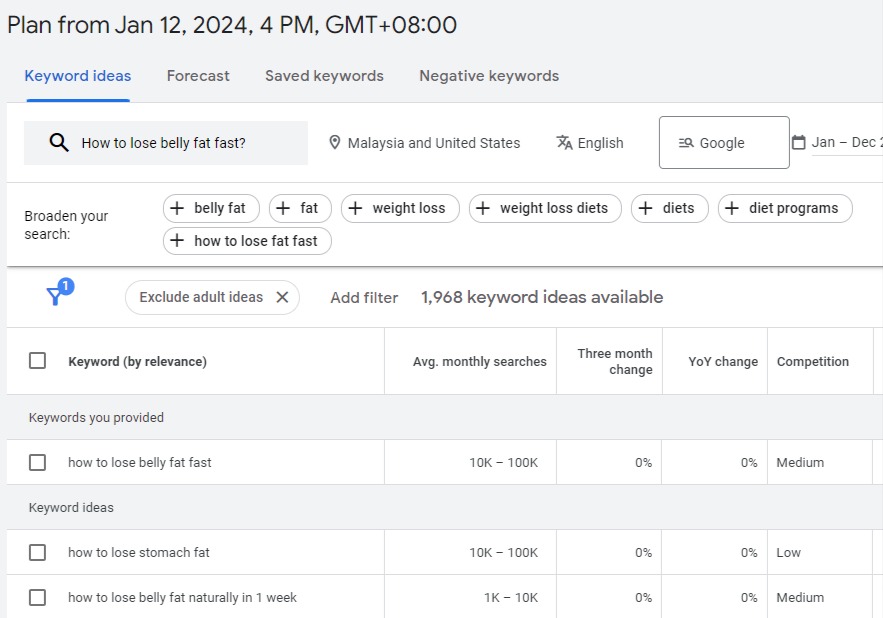Index:
- Introduction
- Understanding Informational Keywords: Your Digital Compass
- Why Informational Keywords Matter for Personal Trainers?
- The Benefits of Using “Informational Keywords” for Personal Fitness
- Types of Keywords Personal Trainers Should Use
- How to Integrate Informational Keywords into Your SEO Strategy?
- 5 Specific Strategies for Personal Trainers Using Informational Keywords
- FAQs
- Conclusion and Call to Action
Introduction
Today, we’re diving deep into something that’s as essential to your online presence as a good pair of sneakers is to a workout – informational keywords.
Picture this: It’s a bright new day, and someone out there is contemplating their first step towards a healthier lifestyle.
They’re probably lounging on their sofa, smartphone in hand, pondering over questions like, “How do I start a fitness journey?” or “What are the best low-impact exercises for beginners?”
These queries, my friends, are what the backbone of their quest for fitness knowledge and your golden ticket to connecting with them.
In a world where ‘high intent keywords’ are like sprinters ready to cross the finish line and ‘navigational search terms’ are the well-trodden paths leading to specific destinations.
Informational keywords represent the curious minds standing at the starting blocks. They’re not quite ready to commit, but they’re eager to learn.
And who better to guide them through their fitness queries than you, armed with expertise and a friendly smile?
So, lace up your digital sneakers, and let’s embark on a journey through the SEO fitness landscape. We’ll explore how to flex your website’s muscles with these keywords, making it as attractive and compelling as a well-toned physique.
It’s not just about lifting the heavy weights of web content; it’s about performing the right exercises that align with the rhythm of your audience’s needs.

Let’s show them how it’s done!
Understanding Informational Keywords: Your Digital Compass
Alright, let’s break it down as if we’re explaining how to do a perfect squat – simple and effective. Imagine you’re a fitness newbie googling “How to start a workout routine?” That question is an informational keyword.
It’s not about buying the latest fitness gear or finding the nearest gym. No, it’s about seeking knowledge, getting those first bits of advice.
In the SEO gym, these are your warm-up exercises. They’re the queries people ask at the start of their health and fitness journey, and they’re gold for personal trainers.
Why? Because answering these questions positions you as the friendly gym buddy everyone needs.
You’re not just selling a service; you’re providing value, guidance, and building trust – and that’s how you win both in the gym and in SEO.
Why Informational Keywords Matter for Personal Trainers?
It matters because they’re like the secret sauce in your digital fitness stew.
Why? Because they connect you with folks who are just dipping their toes in the fitness pool.
Imagine someone Googling “How to start a healthy diet” or “Best home workouts.” These aren’t just random searches; they’re your cue to jump in with answers!
It’s like meeting a new gym member right at the door – an opportunity to make a great first impression.

The Benefits of Using "Informational Keywords" for Personal Fitness
Let’s talk about why they’re like the secret protein powder for your website’s muscle growth. These keywords are the questions your future clients are secretly asking their mirrors.
They’re not quite ready to hit the gym but are curious about, say, “the best exercises for abs” or “how to start a keto diet.”
So, Why Flex with These Keywords?
First Contact:
These keywords are like extending a friendly hand to potential clients who are just stepping into the fitness world.
They’re looking for guidance, and boom – there you are!
Build Trust:
By answering these queries, you’re not just giving out information; you’re building trust.
It’s like being that knowledgeable trainer who not only shows how to do a perfect squat but also explains why it matters.
SEO Gains:
Google loves this stuff. By using informational keywords, you’re feeding Google’s hunger for helpful, quality content.
This means better rankings and more eyeballs on your site.
Establish Authority:
Regularly dishing out helpful answers positions you as the go-to expert.
You’re not just a personal trainer; you’re the encyclopedia of fitness.
Long-Term Relationships:
When people find your answers helpful, they’re more likely to stick around, sign up, or even recommend you.
It’s like planting a seed that grows into a loyal client tree.

Types of Keywords Personal Trainers Should Use
When it comes to the digital arena, knowing your keywords is like understanding the perfect mix of cardio and strength training.
Long tail keywords are your secret sauce to connecting with potential clients.
Let’s dive into the types that will get your website flexing its SEO muscles!
The ‘How-To’:
These are the heavy lifters.
Keywords like “how to start a fitness routine at home” or “how to do a proper deadlift” are pure gold.
They target folks looking for step-by-step guidance – and who better to guide them than you?
The ‘Benefits’:
Lightweight but essential! Use keywords such as “benefits of HIIT training” or “advantages of yoga for stress.”
These attract the crowd keen on understanding the ‘why’ behind the ‘what.’
The ‘Nutrition’:
Every good workout plan needs a nutrition angle.
Keywords like “best post-workout meals” or “nutrition tips for muscle gain” will draw in those looking to complement their workouts with the right diet.
The ‘Local Workout’:
Don’t forget to localize! “Yoga classes in [Your City]” or “best running trails near me” can really zoom in on the local crowd.
This makes your content as relevant as a home gym to a fitness enthusiast.
The ‘Comparison’:
These keywords are for those weighing their options.
Terms like “personal training vs. group classes” or “free weights vs. machines” give insights to those on the fence, helping them decide which fitness path to trot.

So, pump up those keywords and watch your SEO health soar!
How to Integrate Informational Keywords into Your SEO Strategy?
Let’s get down to business and talk about blending keywords into your SEO plan. It’s about lifting your online presence!
Keyword Research:
Start by identifying the right keywords. Think of them as kettlebells – choose the right weight to effectively build your digital muscle.
These are the questions your potential clients are asking, like “How to start a fitness routine?” or “Best post-workout meals?”
Use tools like Google Keyword Planner or SEMrush to find the ones that are just the right fit for your audience.
Courtesy of Ahref.
Content:
Now, let’s put those keywords to work. Your content needs to be as engaging as a high-energy cardio session.
Create blog posts, videos, and social media content that answer these questions.
Each piece of content should be like a personal training session – informative, engaging, and tailored to your audience’s needs.
Mobile First:
Remember, most of your audience is likely using their smartphones.
So, your website needs to be as mobile-friendly as a yoga mat. Ensure it’s responsive, loads faster than a sprinter, and is easy to navigate.
Voice Search Optimisation:
Don’t forget to stretch your strategy to include voice search optimisation.
With more folks using voice assistants, your content should sound natural and conversational, just like chatting with a gym buddy.
Link-Building:
Finally, strengthen your site’s authority with some link-building exercises.
Share your content on social media, collaborate with fitness influencers, and get your articles linked on reputable fitness websites.
It’s like having a spotter in the gym – a little help goes a long way!

Keep your content fresh, relevant, and engaging, and you’ll see your digital presence getting fitter by the day!
5 Specific Strategies for Personal Trainers Using Informational Keywords
Let’s get tactical with those keywords.
It’s like planning a client’s workout regimen – you need the right exercises (keywords) to hit those SEO muscles effectively.
 1st-Target the Right Keywords:
1st-Target the Right Keywords:
Start with the basics.
- What are your clients asking you? “How to lose belly fat fast?” “Best vegan protein sources for athletes?”
- Target for long tail keywords.
- These are your goldmine keywords. They’re the squats and deadlifts of your SEO workout – the foundation.
Keyword research is a vital part of SEO and digital marketing strategies. There are several tools available, both free and paid, that can help you with this task.
Here’s a roundup of some nifty tools :
Image: Google Keywords Planner
Free Tools:
- Google Keyword Planner: The old reliable! It’s like having a wise mentor for keyword research, guiding you through the search landscape. Perfect for beginners and pros alike.
- Ubersuggest: Neil Patel’s brainchild. It’s like having a friendly neighbor who always has some handy tips up his sleeve. Good for getting keyword ideas and insights.
- Answer The Public: This one’s like that curious kid always asking questions. It shows you what people are searching for in a visually appealing format.
- Keyword Surfer: A Chrome extension that’s like having a surfboard to ride the waves of Google search results, showing you keyword data as you go.
- Google Trends: Think of it as your SEO time machine, showing you how keywords have performed over time. Great for spotting trends.
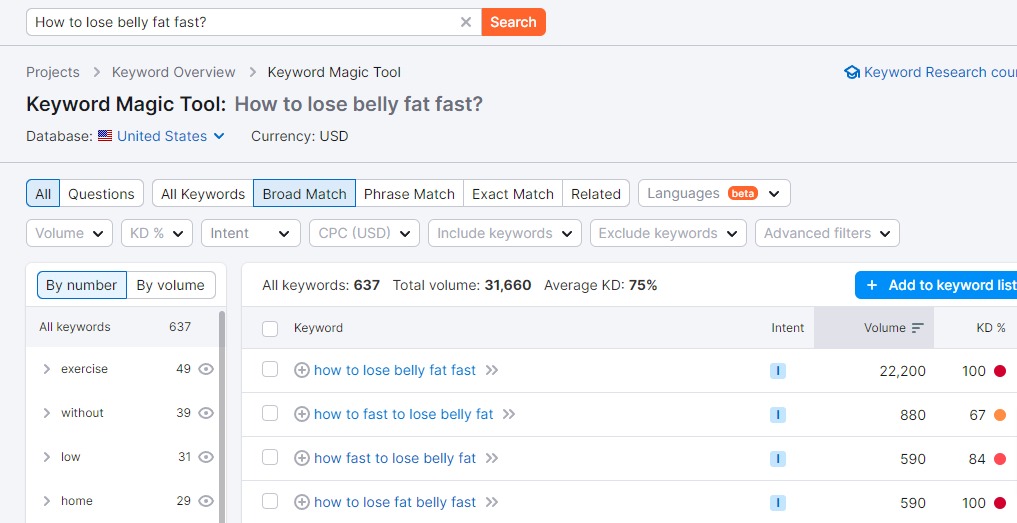
Image: Semrush
Paid Tools:
- SEMrush: The Swiss Army knife of SEO tools. A bit on the pricey side, but it’s packed with features for serious SEO sleuthing.
- Ahrefs: Like a high-tech gadget for SEO pros. Offers a deep dive into keyword research, backlink analysis, and more. A bit expensive, but worth it for the serious detective.
- Moz Pro: It’s like having a wise sage in your corner. Offers a suite of tools including keyword research, site audits, and more.
- KW Finder: A bit like that friend who always knows the coolest, less crowded spots. Great for finding long-tail keywords with low SEO difficulty.
- Long Tail Pro: Specializes in unearthing those long-tail keywords, kind of like using a metal detector on a vast beach of SEO possibilities.
Each of these tools comes with its own set of superpowers.
The free ones are great for getting your feet wet, while the paid ones offer more in-depth analysis for those ready to dive into the deep end of the SEO pool.
 2nd- Create Engaging Content:
2nd- Create Engaging Content:
Now, turn those keywords into engaging content.
- It’s like turning a bland diet into a flavorsome meal prep. Write blogs or create videos that answer these questions in a way that’s easy to digest.
- Be the Jamie Oliver of fitness content – simple, effective, and a bit cheeky.
How do you create engaging content?
Here’s how you whip up content that’s as appealing as your favorite post-workout snack:
Know Your Audience:
It’s like being a personal trainer – you tailor the workout to the client, right? Same with content. Know who you’re writing for.
What are their pain points? What gets them pumped?
Understanding your audience is like having a map in the wilderness of the internet.
Be Conversational:
Write like you talk. Imagine you’re explaining something to a friend over coffee (or a protein shake, in our case).
The goal is to be relatable and understandable. No one likes to read a textbook unless they have to.
Add a Pinch of Humor:
A little humor goes a long way. It’s like doing squats with a smile.
It won’t make the squat easier, but it sure makes it more enjoyable. Just don’t force it – nobody likes a bad dad joke in the middle of a serious discussion.
Use Stories and Examples:
People love stories – they’re the protein to your content’s muscle.
Share success stories, anecdotes, or even personal experiences. It’s like showing someone the transformation photos – it gives them something to aspire to.
Keep It Simple and Structured:
Break your content into digestible chunks – like meal prepping but for information. Use headings, bullet points, and short paragraphs.
Online readers scan content, so make it easy for their eyes to catch the essential bits.
Visuals and Videos:
A picture says a thousand words, and a video probably says a million.
Include relevant images, infographics, or even short videos to explain complex concepts or demonstrate exercises.
End with a Call-to-Action (CTA):
Always finish with a CTA. It’s like the cool-down after a workout.
Guide your readers on what to do next – subscribe, comment, check out a program, or even a simple “share if you like.”
Remember, engaging content is about connecting and providing value. It’s not just about throwing information out there; it’s about making that information resonate with your audience.
 3rd- Use Keywords Naturally:
3rd- Use Keywords Naturally:
Sprinkle these keywords throughout your content like you’re seasoning a healthy stir-fry. But don’t overdo it.
Keyword stuffing is like overdoing cardio – it can do more harm than good.
 4th- Be the Local Hero:
4th- Be the Local Hero:
If you’re focusing on clients in a specific area, mix in some local flavor.
Let’s dive deeper into the strategy for personal trainers – it’s like being the fitness equivalent of the town’s favorite coffee shop: familiar, welcoming, and always on point!
Embracing ‘Local Search Intent’ in Your SEO Game Plan:
Know Your Locale Like the Back of Your Hand:
Connect Local Landmarks with Fitness:
Got a famous landmark or a beloved local park? Why not associate them with fitness tips or workout ideas?
Highlight Local Fitness Events:
Be the Go-To Guru for Local Fitness Queries:
Leverage Local Partnerships:
Personalize Your Approach:
Don’t Forget the Technical Bits:
 5th- Keep It Fresh and Updated:
5th- Keep It Fresh and Updated:
SEO trends change like fitness trends. What’s hot one day (think Zumba) might not be the next.
Regularly update your content to keep it as fresh as your workout playlists.
Remember, it’s not just about being found; it’s about being remembered.
So, make your content as memorable as your most grueling yet rewarding workout session!
FAQs
Answer: These keywords are search queries that people use when looking for information, guidance, or answers to questions. They’re often used in the early stages of research, when someone is not yet ready to make a purchase or decision. For example, “benefits of cardio exercise” or “how to start a vegan diet
Answer: These keywords are crucial for personal trainers because they help you reach potential clients who are seeking fitness and health information. By providing answers to these queries, you establish yourself as an expert, build trust, and lay the foundation for a future client-trainer relationship.
Answer: Start by thinking about common questions your clients ask. Use tools like Google Keyword Planner, AnswerThePublic, or SEMrush to research and find popular search queries related to fitness and health. Also, keep an eye on fitness forums and social media for trending topics.
Answer: These keywords are used by people seeking information or answers, whereas high intent keywords are used by those who are ready to take action, like making a purchase or booking a service. For instance, “how to lose weight” (informational) vs “personal trainer near me” (high intent).
Answer: It’s good to update your website regularly, at least once a week if possible. Regular updates with fresh, relevant content can improve your site’s SEO, keep your audience engaged, and establish your authority in the fitness industry.
Answer: Absolutely! By using informational keywords in your content, you’re likely to answer the queries your target audience is searching for. This can lead to higher traffic, increased engagement, and improved search engine rankings due to the relevance and value of your content.
Answer: While they are important, they should be part of a balanced SEO strategy that also includes high intent and navigational keywords. This approach ensures you cater to potential clients at different stages of their decision-making process.
Answer: Track your website’s traffic, engagement rates, and search engine rankings for the specific keywords you target. Tools like Google Analytics can help you see how visitors find your site and interact with your content, giving insights into the effectiveness of your SEO strategy.
Answer: Definitely! Incorporate them in your social media posts, stories, and video content. This not only improves the visibility of your posts but also drives interested users to your website for more information.
Answer: Navigational search terms are used when a user already knows which website or brand they want to visit. They’re specific to a brand or site name, like “Joe’s Fitness blog” or “Downtown LA Yoga class schedule.” These keywords, on the other hand, are more about general information gathering and not brand-specific.
Conclusion and Call to Action
Take the Leap into SEO Fitness
Now that you’re armed with the know-how of informational keywords, it’s time to step up your SEO game.
Remember, your goal is to be more than just a trainer; you’re a guide, an advisor, and a trusted source of fitness knowledge.
Start weaving these keywords into your content strategy. Whether it’s through blogs, videos, or social media, your insights and expertise can make a real difference in someone’s fitness journey.
So go ahead, flex those SEO muscles, and watch as your digital presence grows stronger and more influential.
Ready to jumpstart your journey as a fitness SEO pro? Let’s get to it and make every word count!
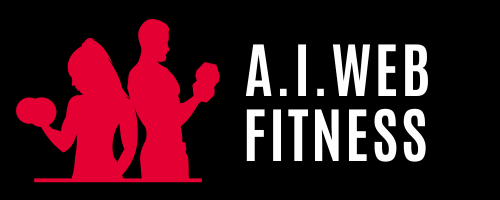
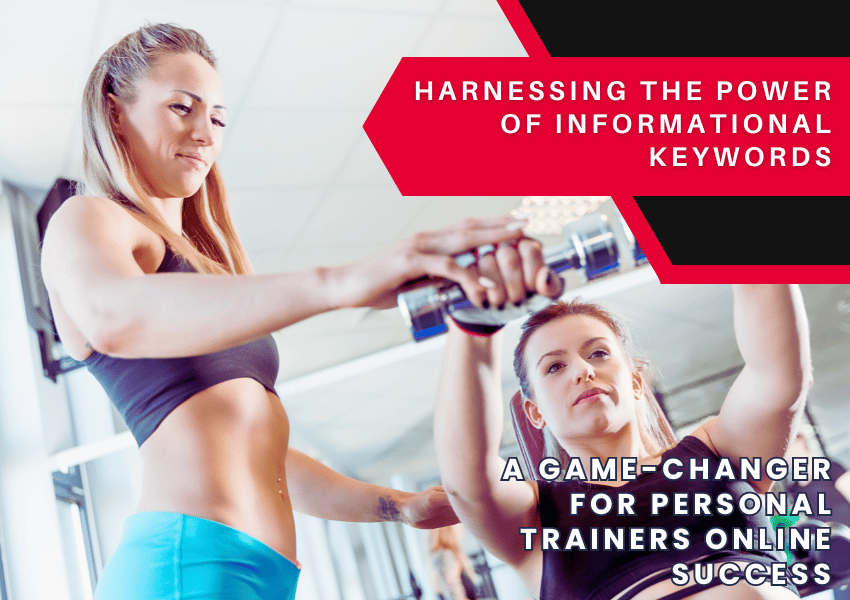
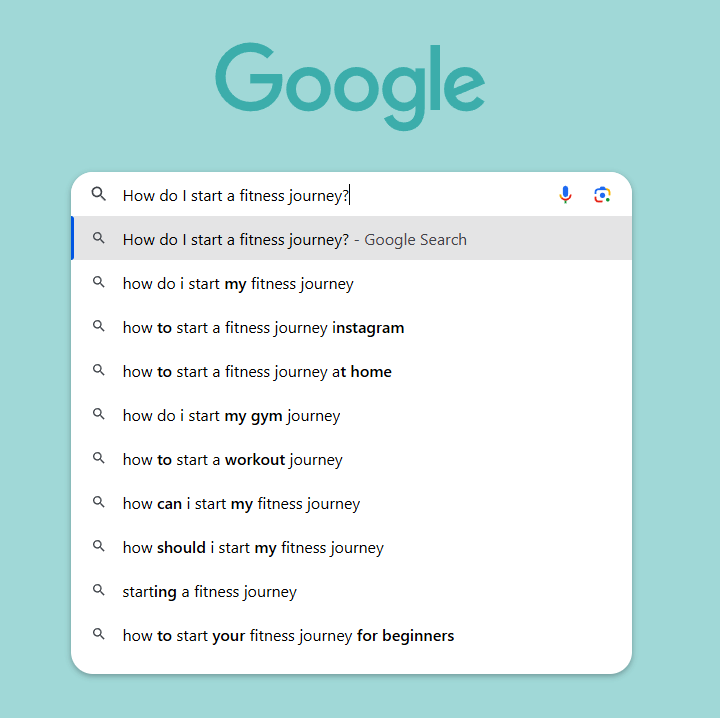

 1st-Target the Right Keywords:
1st-Target the Right Keywords: